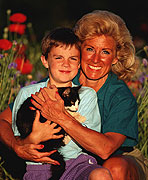
MONDAY, Feb. 7 (HealthDay News) — Children who live with a relative after being removed from their home because of maltreatment have fewer behavioral and social skills problems than children in foster homes, finds a new study.
However, children who live with a relative, also known as a kinship caregiver, may have a higher risk for substance abuse and pregnancy as teenagers, said the researchers at University of Texas Southwestern Medical Center and Children’s Medical Center, Dallas.
They also found that even though kinship caregivers are more likely than foster caregivers to have a low socioeconomic status, they receive fewer support services.
The study included 572 children placed in kinship care and 736 children placed in foster care. Three years after placement, kinship-care children were more likely than those in foster care to have a permanent caregiver (71 percent vs. 56.4 percent). Kinship-care children also had 0.6 times the risk of behavioral and social skills problems and half the risk of using outpatient mental health services or taking psychotropic medications.
However, adolescents in kinship care had twice the risk of substance abuse (34.6 percent vs. 16.9 percent) and seven times the risk of pregnancy (12.6 percent vs. 1.9 percent).
Kinship caregivers tend to be single, unemployed, older and live in poor neighborhoods, said the researchers.
Kinship caregivers were also four times more likely than foster caregivers not to have graduated from high school and three times more likely to have an annual household income of less than $20,000. But kinship caregivers were less than half as likely as foster caregivers to receive any type of financial support, about four times less likely to receive any form of parent training, and seven times less likely to have peer support groups or respite care.
The study appears in the February issue of the journal Archives of Pediatrics & Adolescent Medicine.
“Our findings indicate that kinship caregivers need greater support services,” the researchers wrote in a news release from the publisher. “These findings suggest that increased supervision and monitoring of the kinship environment and increased caregiver support services are urgently needed to improve outcomes of children in kinship care,” they added.
More information
The U.S. Department of Health and Human Services has more about out-of-home care for children.

